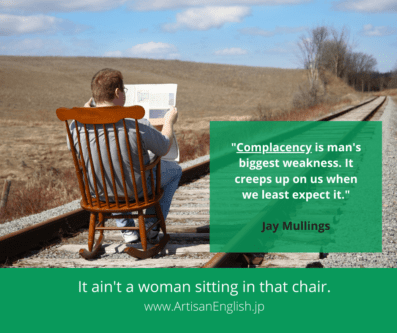
YouTube / iTunes / Spotify / Radio Public / Pocket Casts / Google Podcasts / Breaker / Overcast
Listen to ArtisanEnglish.jp posts & lesson intros here.
WotD: Complacent
Estimated reading time: 2 minutes
Coronavirus is back, baby! And it is back with a vengeance!
The truth of the matter is it was never actually gone, and now that people have become complacent, we have allowed it to attack again.
Now the danger zone is India.
If you follow the news, you know they were lauded as an example to the world for how they handled the pandemic – initially, that is.
Then they became complacent.
That country was doing amazingly well.
To become complacent means you have become overconfident in your abilities and satisfied with what you have achieved to the point where you feel you don’t have to work harder.
Indians, both the people and the government, convinced themselves that they had defeated the coronavirus and subsequently let down their guard.
The Canadian Broadcasting Corporation (CBC) reported large gatherings of people with no one wearing masks became a common sight before the current spike in infections.
That was a mistake.
Like or follow ArtisanEnglish.jp on social media.
Now hundreds of thousands are being infected every day.
We, in Japan, must remain vigilant and not go down the same path of complacency.
Unfortunately, it may already be too late.
Daily infections in Osaka have reached an all-time high, while those in other cities, including Tokyo, have been steadily increasing.
Japanese have become complacent.
Yes, everyone wears a mask, but this is a new pandemic with new variants of last year’s coronavirus.
It’s more potent, more deadly and affects the young.
When you are driving on the highway, speed kills. When it comes to coronavirus, complacency kills.
Coronavirus kills.
Don’t become complacent.
Flesch-Kincaid Readability Test
This post is understandable by someone with at least an 8th-grade education (age 13 – 14).
On the Flesch-Kincaid reading-ease test, this post scores 63.
The easier a passage is to read, the higher the score on a scale of 0 – 100.

